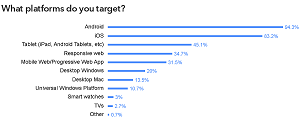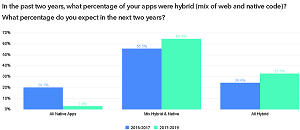News
Survey: Devs Love Visual Studio Tooling, but Not for UWP Apps
Developers surveyed by Ionic really love Visual Studio Code and like Visual Studio proper, but they're using those tools to mostly target non-Windows platforms.
That finding was gleaned from the company's new developer survey, conducted to find out what tools and techniques are being employed by developer respondents (the vast majority of whom are presumably using the Ionic framework, mostly known for creating hybrid mobile apps).
The survey indicated Visual Studio Code was the overwhelming favorite text editor/IDE, used by 47 percent of respondents, while the full-blown Visual Studio IDE was sixth on the list, reportedly used by 13 percent of respondents (multiple responses were allowed in the survey).
"VS Code was launched two years ago at the 2015 Microsoft Build conference," the survey report said. "Aimed at cross-platform developers, Code was touted for its speed (fast), size (small) and advanced debugging features.
"Fast-forward two years, and adoption of Code has grown to nearly half of the developers we surveyed (46.7 percent) -- by far the most widely adopted among editors and IDEs on the list. Sublime, Atom and Webstorm trail as the next most popular code editors.
"Add to that the 12.7 percent of devs using Visual Studio IDE, and it looks like Microsoft has really won over developers with its code editing and development toolsets," the report continued. "Of course, it doesn't hurt that Microsoft is the reference editor for common tools like Typescript, which may have helped them become the defacto text editor."
 [Click on image for larger view.]
Top Tools (source: Ionic)
[Click on image for larger view.]
Top Tools (source: Ionic)
However, when it comes to what platforms are being targeted by Ionic developers using Microsoft tools and others, Microsoft doesn't fare nearly as well.
While Android (targeted by 94 percent of respondents) and iOS (83 percent) are no-brainer obvious targets for Ionic developers, surprisingly few are targeting the Universal Windows Platform (UWP).
 [Click on image for larger view.]
Dev Targets (source: Ionic)
[Click on image for larger view.]
Dev Targets (source: Ionic)
Specifically, more respondents (nearly 14 percent) are targeting the Mac desktop than are those aiming for UWP apps (nearly 11 percent). Traditional desktop Windows apps are targeted by 20 percent of respondents.
In other survey findings, the hybrid approach to developing mobile apps was said to be gaining ground over the native approach, which is expected to drop dramatically over the next two years.
In fact, that was the main takeaway from the report, according to Ionic CEO Max Lynch, who said in a blog post last week that the major theme of the survey was: "Right now is a great time to be a Web developer."
"Two years ago, 20 percent of developers surveyed were building exclusively with native tools instead of hybrid," the survey report says. "In the next two years, that number is only 2.9 percent -- a nearly 7x decrease. Similarly, the number of hybrid-built apps is growing as a share of overall app development. In the next two years, 32.7 percent of developers surveyed expect to completely abandon native development in favor of hybrid."
In the hybrid approach, Web technologies such as HTML and JavaScript are used to create apps that can access native device features and be installed through app stores -- as opposed to true native apps created with programming languages such as Swift (iOS) and Java (Android).
As Ionic's open source framework produces hybrid apps with the help of those Web technologies and Apache Cordova, Lynch was quick to correct the notion that the survey results might be biased by self-selected respondents.
Noting that 80 percent of respondents identified as Web developers, Lynch said: "Now, one might think there's a little bit of selection bias here -- after all, we already cater to developers with a Web skillset -- but we think it's a little more than that. In fact, if you check out the 2017 Stack Overflow Survey, you'll see a similar distribution of Web developers to native mobile developers."
 [Click on image for larger view.]
Waning Native (source: Ionic)
[Click on image for larger view.]
Waning Native (source: Ionic)
In that Stack Overflow survey (covered in sister publication ADTmag here), 73 percent of respondents identified themselves as Web developers, with 23 percent reporting being mobile developers. The Stack Overflow survey didn't explicitly indicate if "mobile developers" correlated exactly to "native developers," but in the report's "developer types" section, mobile developer respondents were classified in Android, iOS, Windows Phone and Blackberry categories. The report didn't include any other specific native-vs.-Web breakdowns.
Lynch maintained that the purpose of the survey was not to prove anything about the Web, but rather to learn about tools and technologies being used by developers to create apps.
While Lynch identified the hybrid-overtaking-native theme as the dominant takeaway from the survey, other major trends included: the rising popularity of Progressive Web Apps (PWAs); the lack of wearable and smart device (such as TVs) development; and the rise of enterprise apps for internal usage, as opposed to commercial consumer apps (which is still the dominant use case).
The survey report said nearly 32 percent of respondents were targeting PWAs (described as a "big jump"), with a slightly higher percentage targeting responsive Web apps.
"What's driving this trend?" the report said. "Part of it could be app fatigue among consumers who care more about mobile experiences and less about installing yet another app, and developers who want their apps to run on mobile and desktop Web environments, not just in the app stores.
"Overall, we see this as validation for two things that Ionic has been saying for awhile: mobile remains the killer platform, and Web is the future."
Only 3 percent of respondents said they were building for smart watches, with even fewer targeting TVs, Ionic said.
The report also explained the increase in mobile app development for internal enterprise usage.
"A large percentage of apps being built with Ionic (41.7 percent) are actually for internal-use apps. This is consistent with a broader trend in the enterprise, where the value of mobile extends beyond the essential flagship consumer app. More and more, older legacy systems are steadily being replaced -- or modernized -- with mobile experiences that make employees happier, and more productive."
Other highlights of the survey (with percentages rounded off) include:
- Google's Firebase is the clear winner in back-end services, scoring first or nearly first in many categories such as push notifications, analytics, databases, authentication and more.
- Node.js is the dominant choice (reported by 57 percent of devs) when it comes to back-end technology.
- Google owns the analytics space, with Google Analytics and Firebase Analytics emerging as clear winners (used by 68 percent and 25 percent of devs, respectively).
- The adoption of Visual Studio Code has grown to nearly half of the developers surveyed (47 percent) -- by far the most widely adopted among editors and IDEs on the list. Sublime, Atom and Webstorm trail as the next most popular code editors.
- 65 percent of respondents said they don't do cloud device testing.
- 44 percent said they don't track errors or crashes.
- 53 percent don't push updates to apps remotely.
- Nearly 82 percent distribute apps through stores.
- 57 percent develop on the Mac platform, followed by Windows (55 percent) and Linux (29 percent).
- 94 percent target Android, 83 percent target iOS.
- Respondents were almost equally split between being Web developers experienced with mobile and new to mobile, both at about 39 percent.
The survey was fielded from February to June, garnering responses from 13,248 developers collected directly by Ionic using Google Forms.
About the Author
David Ramel is an editor and writer at Converge 360.